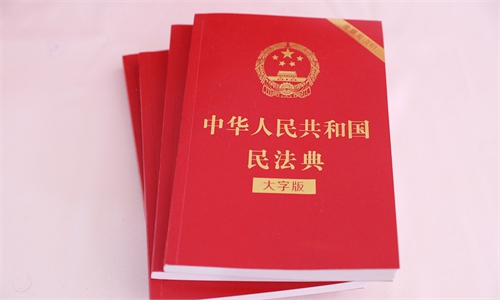Wuhan says half of couples who registered for divorce gave up after cooling-off period

Photo: CFP
Over half of the couples in Wuhan who registered for divorce decided against it at the end of the new 60-day cooling-off period, a policy introduced by a Chinese national law in January. The news sparked a heated discussion on the topic of difficult divorces among Chinese netizens.
Since the cooling-off period was introduced, around 58 percent of couples decided not to split up at the end of a 60-day cooling-off period, according to the report published by the civil affairs bureau of Wuhan in Central China's Hubei Province on Tuesday, where 3,096 couples had registered in January; 1,309 were issued with a certificate for divorce as of March 5.
The "three killers" of a perfect marriage, the Wuhan civil affairs bureau said based on a survey with 1,150 participants, are personality differences, trivial life problems and lack of communication.
After "marriage and family counseling" was introduced as a necessary procedure for divorce applications during the cooling-off period, more couples tend to be willing to get back together instead of splitting up, said the report.
The divorce cooling-off period was introduced as part of the first-ever Civil Code in China, which provides legal protection for citizens' private rights.
With a total number of 60 days before issuing the divorce certificate, it contains a 30-day cooling-off period, and another 30-day limit that allows the couple to get their certificate from the local civil affairs bureau.
The whole procedure contains a series of steps for a divorce. First, the application must be handed in by both sides as a couple; second, the application can be canceled if either side wants to withdraw from the procedure; third, both sides need to appear at the local civil affairs bureau within the next 30-day limit; and after a careful review by the local authority, the certificate will be issued at last.
The policy sparked heated discussion among Chinese netizens on the Sina Weibo when it was introduced. Now the topic is again attracting debate after the report from Wuhan, with some questioning whether extending and complicating the process of divorce is the right path to take for a broken marriage.
"It only intensifies the contradictions within a marriage, as well as the domestic violence," said one netizen.
"The policy only cares about the numbers and the divorce rate but overlooks the fact that loads of people are living in hell and can't escape due to the policy," another netizen said on Weibo.
Experts noted that the cooling-off period only applies to the circumstances of the divorce agreement but not the litigation, in which the victims of domestic violence need to seek to their own protection in court.
Others said the policy restricts people's freedom within a marriage.
China has seen a surging divorce rate in recent decades, rising from 580,000 in 1987 to 3.73 million in 2020. Meanwhile, the marriage rate, according a report by Tsinghua University's Evergrande Research Institute, has dropped from 13.47 million couples to 8.13 million.


